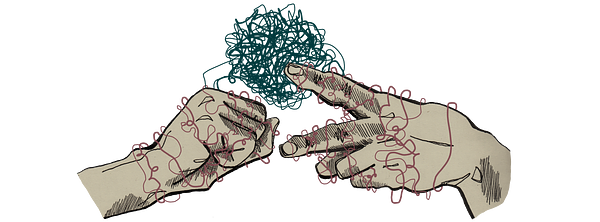Professionals and Practitioners
This digital resource tells the story of how our brains interpret the world around us and how this translates in our bodies, emotions and behaviours. It has been designed to be used by professionals working with young people interested in learning more about the science of conflict and boosting their wellbeing.

Unhelpful Thinking Styles
Summary
- ‘Unhelpful thinking styles’ refer to patterns of thought that are characterised by cognitive distortions or biases, leading to negative interpretations of oneself, others, and the world.
- These patterns of thinking can hinder effective problem-solving, strain relationships, and contribute to emotional distress.
- Unhelpful thinking styles often involve rigid or irrational beliefs, selective attention to negative information, and distorted perceptions of reality; they interfere with individuals' ability to cope with challenges and inhibit their overall well-being.
- The more common unhelpful thinking styles include 'all or nothing', 'mental filter', 'catastrophising', and 'personalisation'.
- Challenging unhelpful thinking styles isn't just about promoting a positive mindset; it's about fostering resilience, enhancing problem-solving abilities, and improving overall well-being.
- Challenging Unhelpful Thinking Styles improves mood, deduces stress, and solves problems positively.
Family conflicts can be exacerbated by unhelpful thinking styles, which contribute to misunderstandings, heightened tensions, and damaged bonds.
‘Unhelpful thinking styles’ refer to patterns of thought that are characterised by cognitive distortions or biases, leading to negative interpretations of oneself, others, and the world. These patterns of thinking can hinder effective problem-solving, strain relationships, and contribute to emotional distress. Unhelpful thinking styles often involve rigid or irrational beliefs, selective attention to negative information, and distorted perceptions of reality. Overall, unhelpful thinking styles impede individuals' ability to cope with challenges and inhibit their overall well-being.
As professionals working with families in such situations, it's crucial to understand these unhelpful thinking patterns and equip both parents and children with strategies to challenge and overcome them.
In this article, we'll explore four specific unhelpful thinking styles – 'all or nothing', 'mental filter', 'catastrophising', and 'personalisation'.
1. All or Nothing Thinking
This thinking style involves viewing situations in black-and-white terms, with no room for middle ground or nuance. Individuals tend to perceive things as either perfect or a complete failure, leaving little space for realistic assessment. For example, a young person might see themselves as a total failure if they don’t get full marks in a test – even if they got almost full marks!
Disadvantages: All or nothing thinking sets unrealistic standards and fosters feelings of inadequacy and disappointment. It can lead to a cycle of self-blame and low self-esteem, damaging relationships with both oneself and others.
Solutions: Encourage clients to challenge their extreme views by examining evidence for and against their beliefs. Help them identify shades of grey and acknowledge small successes, fostering a more balanced perspective.
2. Mental Filter
This thinking style involves selectively focusing on negative aspects of a situation while ignoring any positive elements. It's like seeing the world through a lens that distorts reality, magnifying flaws and minimising strengths. For instance, a child may focus solely on their parent's occasional criticism, disregarding their consistent support and affection.
Disadvantages: The mental filter reinforces a pessimistic outlook, leading to feelings of hopelessness and despair. It can strain relationships by overshadowing moments of joy and connection with persistent negativity.
Solutions: Encourage clients to broaden their perspective by consciously acknowledging positive aspects of their experiences. Practice gratitude exercises and mindfulness techniques to shift focus away from negativity and towards appreciation.
3. Catastrophising
Catastrophising involves imagining the worst possible outcome of a situation and dwelling on it excessively. It entails blowing things out of proportion and assuming that even minor setbacks will lead to catastrophic consequences. For example, a young person might think a friend who hasn’t shown up when they said they would must hate him, when in fact the friend has fallen ill suddenly.
Disadvantages: Catastrophising fuels anxiety and amplifies stress levels, making it difficult to cope with everyday challenges. It undermines resilience and problem-solving abilities, leading to avoidance behaviours and further conflict.
Solutions: Help clients challenge catastrophic thoughts by examining evidence for more realistic outcomes. Encourage them to consider past experiences where things turned out better than feared and to focus on solutions rather than dwelling on potential disasters.
4. Personalisation
Personalisation involves attributing undue responsibility to oneself for external events or others' behaviours. It's the tendency to interpret situations as being directly caused by one's own actions or characteristics, even when other factors are at play. For instance, a child may blame themselves for their parents' divorce, assuming it was due to something they said or did.
Disadvantages: Personalisation fosters guilt and self-blame, eroding self-esteem and hindering personal growth. It strains relationships by creating undue pressure and misunderstanding, as individuals take on responsibility that isn't theirs to bear.
Solutions: Assist clients in recognising the role of external factors and other individuals' agency in shaping events. Encourage them to challenge their tendency to personalise by considering alternative explanations and reframing situations in a more balanced light.
Why Challenging Unhelpful Thinking Styles Is Essential
Challenging unhelpful thinking styles isn't just about promoting a positive mindset; it's about fostering resilience, enhancing problem-solving abilities, and improving overall well-being. Here's why it's crucial for professionals working with families to address these patterns:
Challenging Unhelpful Thinking Styles Improves Mood
By encouraging clients to challenge negative thought patterns, professionals help them cultivate a more optimistic outlook and reduce feelings of despair and hopelessness. This, in turn, enhances mood and fosters a sense of emotional resilience, enabling individuals to navigate challenges with greater ease.
Challenging Unhelpful Thinking Styles Reduces Stress
Unhelpful thinking styles often contribute to heightened stress levels, as individuals perceive threats and setbacks as more significant than they truly are. By challenging these patterns and promoting a more balanced perspective, professionals help clients alleviate unnecessary stress and cultivate greater emotional stability.
Challenging Unhelpful Thinking Styles Solves Problems Positively
By reframing situations and considering alternative interpretations, individuals become better equipped to tackle challenges constructively. Challenging unhelpful thinking styles fosters creativity and resilience, empowering clients to approach problems with a solution-oriented mindset rather than succumbing to despair or avoidance.
Conclusion
In conclusion, unhelpful thinking styles can exacerbate family conflicts and strain relationships, but they are not insurmountable obstacles. By understanding these patterns and equipping families with strategies to challenge and overcome them, professionals play a vital role in promoting resilience, fostering healthy relationships, and facilitating positive growth. Through collaborative efforts, families can learn to navigate challenges with greater ease and build stronger, more resilient bonds.
References and Further Reading
- Unhelpful Thinking Styles. Centre for Clinical Intervention, 2023.
- Cognitive Distortions – Unhelpful Thinking Styles. Psychology Tools, 2023.
- Unhelpful Thinking Styles. University of New Hampshire, 2023.
- 6 unhelpful thinking patterns and how to identify them. Therapy for You, 2021.
- 25 Unhelpful Thinking styles in Depression and Anxiety. Access CBT, 2023.





